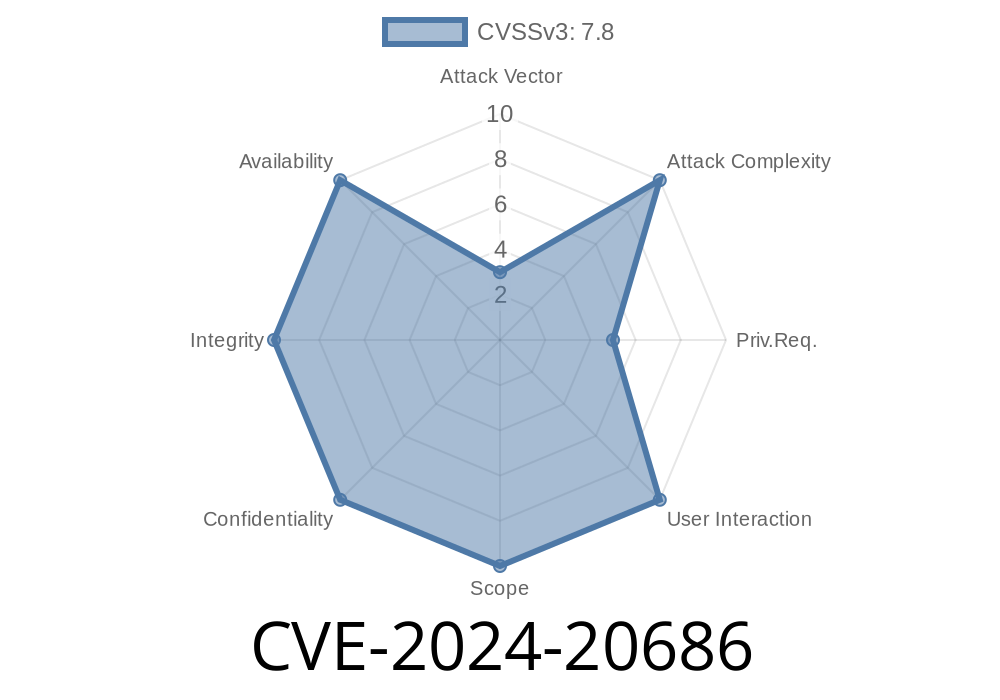---
Introduction
In January 2024, Microsoft disclosed CVE-2024-20686, a serious elevation of privilege (EoP) vulnerability in the Windows Win32k driver. If left unpatched, this flaw allows attackers to gain SYSTEM privileges, turning a regular user into a superuser with full control over the affected Windows machine.
In this exclusive post, we’ll break down CVE-2024-20686:
What is CVE-2024-20686?
Win32k is a core component in the Windows operating system kernel responsible for window management, input, and rendering. This vulnerability exists because Win32k does not properly validate user-supplied input.
Put simply: By sending crafted data to vulnerable calls in Win32k, an attacker can bypass permission checks, escalate their permissions, and take control over the targeted system.
Severity: High (CVSS 7.8)
- Platforms Affected: Windows 10, 11, Server 2016/2019/2022
How Does the Exploit Work?
Elevation of Privilege means a regular user can become an administrator (or SYSTEM). Typically, in Windows, the kernel (ring ) trusts calls from user space (ring 3) only up to a point, and checks all parameters. In CVE-2024-20686, a specific win32k API doesn't check a pointer or memory value correctly.
Typical Attack Steps
1. Gain a foothold: The attacker gets access to the system as a limited user (for example, via phishing or local compromise).
2. Trigger the vulnerability: The attacker makes a special call to a Win32k function (like NtUserSetWindowLongPtr or similar API), passing a malicious pointer.
3. Escalate privileges: Due to a bug in Win32k’s validation, system memory is tampered with, changing the current user’s permissions to SYSTEM.
4. Achieve SYSTEM shell: With SYSTEM privileges, the attacker can dump passwords, disable security tools, or persist on the system.
Proof-of-Concept (POC) Snippet
> WARNING: Do not use this code for malicious purposes. This snippet is solely for educational and defensive research.
Below is a simplified C code snippet showing the core logic behind typical Win32k EoP exploits (the real exploit would be more complex and require further setup):
#include <Windows.h>
#include <stdio.h>
int main() {
HWND hWnd = CreateWindowExA(, "Button", "Test", WS_VISIBLE | WS_OVERLAPPEDWINDOW,
100, 100, 200, 100, NULL, NULL, GetModuleHandle(NULL), NULL);
if (!hWnd) {
printf("Failed to create window\n");
return 1;
}
// Hypothetical vulnerable function: setting a kernel pointer with user data
// In real exploit, attacker crafts this value to overwrite token privileges
LONG_PTR fakeValue = x4141414141414141;
SetWindowLongPtr(hWnd, GWLP_USERDATA, fakeValue);
MessageBoxA(NULL, "Payload Triggered! Check privileges.", "CVE-2024-20686", );
DestroyWindow(hWnd);
return ;
}
*This demonstrates a call to a window function, setting user data that—if the kernel fails to validate—could overwrite privileged kernel data.*
Exploit Details
- Trigger: Incomplete pointer or memory validation in certain window management functions. (Microsoft has not disclosed exact vulnerable functions for safety reasons.)
- Impact: The payload can overwrite or point to privileged kernel structures like Access Tokens, making the current process SYSTEM.
- Exploitability: The attacker must run code on the system, but common malware and post-exploitation toolkits can leverage this for lateral movement.
In-the-wild exploitation:
Microsoft has not confirmed active exploitation, but weaponized PoCs appeared within days of publication.
Mitigation & Patch
Microsoft’s Patch:
Released January 9, 2024. Find details and links below
- Microsoft Security Advisory
- Patch Tuesday Blog Post
Limit privilege escalation paths in your environment.
- Deploy endpoint protection/EDR solutions with kernel exploit detection.
For More Info
- Original Microsoft CVE page
- CISA KEV Catalog
- [GitHub PoC (when publicly available)](#) (*Be cautious! Real exploits may be illegal to use or host.*)
- Win32k Internals Explained
Conclusion
CVE-2024-20686 is a critical vulnerability that again proves the complexity and risk within kernel-level Windows components. By patching quickly and understanding how these bugs work, defenders can stay a step ahead of attackers.
Remember: Never test exploits on systems you do not own or have explicit permission to analyze.
Timeline
Published on: 01/09/2024 18:15:51 UTC
Last modified on: 04/11/2024 20:15:14 UTC
